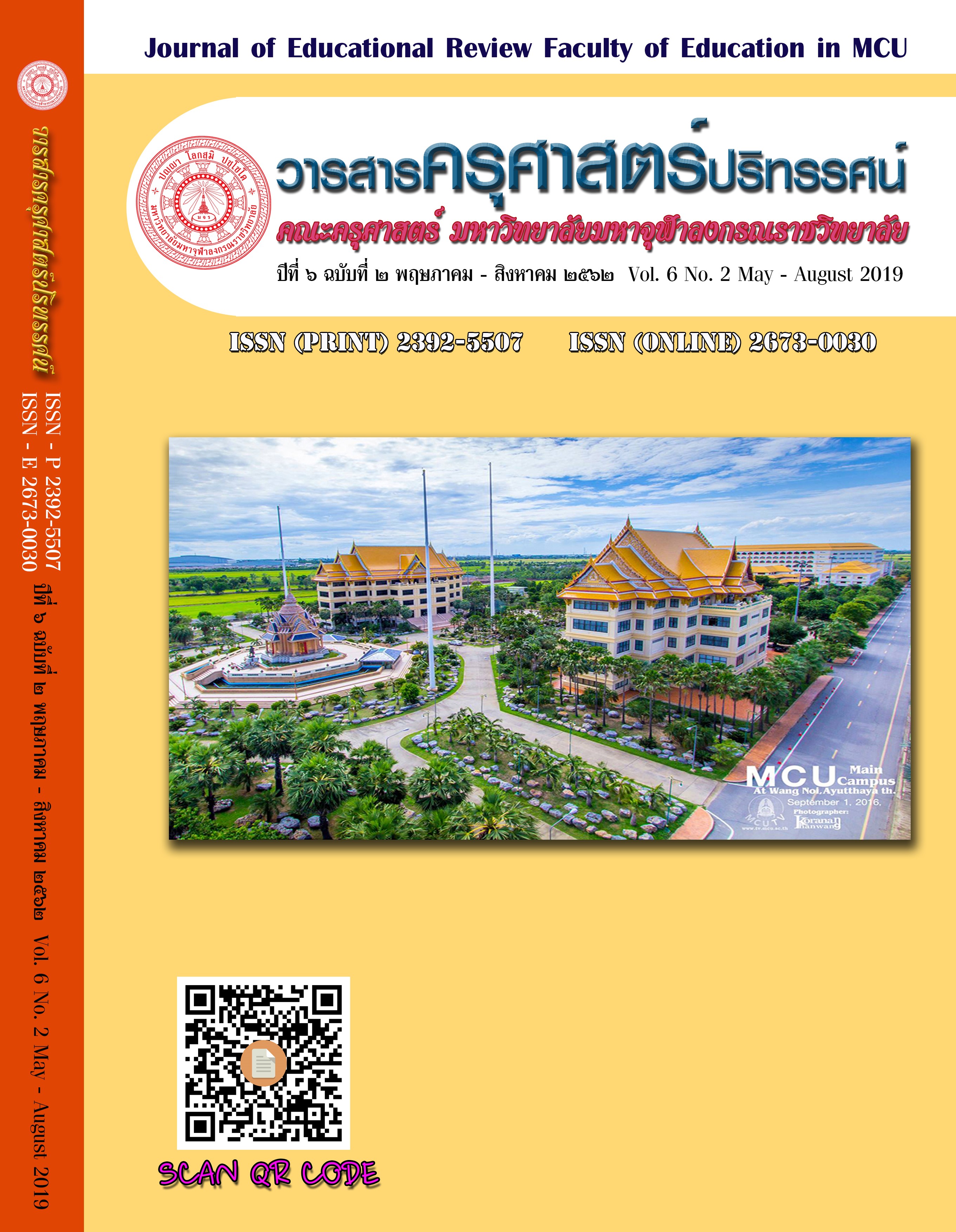Development of a Training Curriculum to Enhance Research Culture in Learning Management for Primary School Teachers Under Buengkan Primary Educational Service Area Office
Main Article Content
Abstract
The purposes of this research were: ๑) to study the components and indicators of the research culture in the learning management of primary school teachers, ๒) to study the state, expectations and needs of enhancing the research culture in the learning management of primary school teachers, ๓) to develop a training curriculum to enhance the research culture in the learning management of primary school teachers, and ๔) to study the results of experiment in using the developed curriculum. A sample used in the study of state and expectations of the research culture in the learning management was ๓๒๗ primary school teachers under the Office of Bueng Kan Primary Education Service area in academic years ๒๐๑๗, who were selected by multi-stage random sampling and whose size was determined using Krejcie and Morgan Table. The sample used in experiment of using the curriculum was ๑๔ primary school teachers in the Non Sawang Pong Pueai Khaisi School Group under the Office of Bueng Kan Primary Education Service Area in academic year ๒๐๑๗, which were derived from purposive selection on a voluntary basis. The instruments used in the study were a questionnaire of state and expectations of the research culture, a curriculum, a manual for the use of the curriculum, a test of the research culture in the management of learning on research knowledge, an assessment form of beliefs about research, an assessment form of the use of research in learning management, and an assessment form of teachers’ satisfaction with the curriculum. Statistics used in data analysis were percentage, mean, standard deviation, and Wilcoxon signed-ranks test.
Findings of the study were as follows:
๑. The research culture in the learning management had ๓ components and ๔๕ indicators. Component ๑ – knowledge about research in the learning management comprising ๑๓ indicators; component ๒ – beliefs about research comprising ๑๘ indicators; component ๓ – use of research in the management of learning regularly comprising ๑๔ indicators.
๒. The results of studying the state, expectations and needs showed that the overall state was at low level (= ๑.๘๑, S.D. = ๐.๑๗), the overall expectation was at the highest level (= ๔.๕๕, S.D. = ๐.๐๙), and the needs of all the components had the values of PNImodified higher than ๐.๓๐.
๓. The developed training curriculum had ๘ components: ๑) background, ๒) principles, ๓) objectives, ๔) research culture components, ๕) content structure, ๖) activities, ๗) media and sources of learning, and ๘) measurement and evaluation. The content structure consisted of ๗ units. Unit ๑ – orientation of ‘how are the teachers who have a culture of research’; unit ๒ – research and management of learning; unit ๓ – how to get started with research in learning management; unit ๔ – how to make research successful; unit ๕ – composing and presenting the success of research in learning management; unit ๖ – putting knowledge into research practice in real situations; unit ๗ – seminar on evaluation and conclusion of training by training at the ๓-day training room (๑๘ hours) and practicing doing research at the school for ๔ weeks.
Use training activities as a basis for school-based, reflection and adult learning.
๔. The results of experiment in using the curriculum found the following:
๔.๑ The research culture on teacher knowledge after the training was significantly higher than that before the training at the .๐๕ level.
๔.๒ The research culture on beliefs about teacher research after the training was significantly higher than that before the training at the .๐๕ level.
๔.๓ The research culture on the use of research in the regular learning management of teachers after the training was at the highest level (= ๔.๕๔, S.D. = ๐.๑๘) and higher than the criterion set at ๓.๕๑.
๔.๔ The teachers’ satisfaction with the use of the training curriculum was at the highest level (= ๔.๕๕, S.D. = ๐.๐๘).
Article Details
ทัศนะและความคิดเห็นที่ปรากฏในบทความในวารสารฉบับนี้ถือเป็นความรับผิดชอบของผู้เขียนบทความนั้นเพียงผู้เดียว และไม่ถือเป็นทัศนะและความรับผิดชอบของกองบรรณาธิการ
กองบรรณาธิการขอสงวนสิทธิ์ในการคัดเลือกบทความลงตีพิมพ์และจะแจ้งให้เจ้าของบทความทราบหลังจากผู้ประเมินบทความตรวจอ่านบทความแล้ว
ต้นฉบับที่ได้รับการตีพิมพ์ในวารสารครุศาสตร์ปริทรรศน์ คณะครุศาสตร์ มหาวิทยาลัยมหาจุฬาลงกรณราชวิทยาลัย ถือเป็นกรรมสิทธิ์ของคณะครุศาสตร์ มหาวิทยาลัยมหาจุฬาลงกรณราชวิทยาลัย ห้ามนำข้อความทั้งหมดหรือบางส่วนไปพิมพ์ซ้ำ เว้นเสียแต่ว่าจะได้รับอนุญาตจากมหาวิทยาลัยฯ เป็นลายลักษณ์อักษร
References
ชัยวัฒน์ สุทธิรัตน์. (๒๕๕๖). การพัฒนาหลักสูตร ทฤษฎีสู่การปฏิบัติ. กรุงเทพมหานคร: วีพรินท์.
ชุติมา โชคมาเสริมกุล. (๒๕๕๒). การพัฒนาหลักสูตรฝึกอบรมเรื่องการสร้างสื่ออิเล็กทรอนิกส์โดยใช้โรงเรียนเป็นฐาน สำหรับครูวิทยาลัยอาชีวศึกษาสระบุรี. วิทยานิพนธ์ครุศาสตรมหาบัณฑิต. ลพบุรี: มหาวิทยาลัยราชภัฏเทพสตรี.
ธีระ รุญเจริญ. (๒๕๕๕). ความเป็นมืออาชีพในการจัดและบริหารการศึกษา ยุคปฏิรูปการศึกษา. พิมพ์ครั้งที่ ๗. กรุงเทพมหานคร: ข้าวฟ่าง.
บุญธรรม กิจปรีดาบริสุทธิ์. (๒๕๕๑). ระเบียบวิธีการวิจัยทางสังคมศาสตร์. พิมพ์ครั้งที่ ๑๐. กรุงเทพมหานคร: จามจุรีโปรดักท์.
ปวีกรณ์ คลังข้อง. (๒๕๕๖). วัฒนธรรมวิจัยของครูในจังหวัดปัตตานี. วิทยานิพนธ์การศึกษามหาบัณฑิต. สงขลา: มหาวิทยาลัยสงขลานครินทร์.
พงษ์พัชรินทร์ พุธวัฒนะ. (๒๕๕๐). นวัตกรรมเพื่อการพัฒนาวัฒนธรรมวิจัยของอาจารย์มหาวิทยาลัยสงขลานครินทร์ วิทยาเขตปัตตานี. ปัตตานี: มหาวิทยาลัยสงขลานครินทร์ วิทยาเขตปัตตานี.
พลสัณฑ์ โพธิ์ศรีทอง. (๒๕๕๑). การพัฒนาครูประจาการที่ใช้โรงเรียนเป็นฐานและมุ่งผลให้เกิดต่อการเรียนรู้ของผู้เรียนโดยตรง. วารสารข้าราชการ. ๑๘(๕), ๑๑-๑๔.
เรืองยศ เพชรสุก. (๒๕๕๔). การวิจัยและพัฒนาหลักสูตรฝึกอบรมเพื่อเสริมสร้างความรู้ด้านการวิจัยของครู ในเขตพื้นที่การศึกษาประถมศึกษาอุบลราชธานี เขต ๕. วิทยานิพนธ์ปรัชญาดุษฎีบัณฑิต. อุบลราชธานี: มหาวิทยาลัยราชภัฏอุบลราชธานี.
วิชัย วงษ์ใหญ่. (๒๕๕๔). การพัฒนาหลักสูตรระดับอุดมศึกษา. กรุงเทพมหานคร: อาร์ แอนด์ ปริ้นท์.
วิษณุ ทรัพย์สมบัติ. (๒๕๔๙). การพัฒนาวัฒนธรรมการประเมินการเรียนการสอนของครู: การฝึกอบรมโดยใช้โรงเรียนเป็นฐานด้วยการสร้างเครือข่ายและการคิดสะท้อนอภิมาน. กรุงเทพมหานคร: จุฬาลงกรณ์มหาวิทยาลัย.
สมใจ กงเติม. (๒๕๕๓). การศึกษาความต้องการในการพัฒนาสมรรถนะครู สังกัดสำนักงานเขตพื้นที่การศึกษาประถมศึกษาเพชรบูรณ์ เขต ๒. เพชรบูรณ์: มหาวิทยาลัยราชภัฏเพชรบูรณ์.
สำนักงานคณะกรรมการการศึกษาขั้นพื้นฐาน. (๒๕๕๓). แนวดำเนินการสร้างวัฒนธรรมการวิจัย. กรุงเทพมหานคร: สานักงานคณะกรรมการการศึกษาขั้นพื้นฐาน.
สุวิมล ว่องวาณิช. (๒๕๔๘). การวิจัยและประเมินความต้องการจำเป็น. กรุงเทพมหานคร : สานักพิมพ์แห่งจุฬาลงกรณ์มหาวิทยาลัย.
Leitch, R. and Day, C. (2001). Reflective process in action: mapping personal and professional contexts for learning and change. Journal of In-Service Education. 27(2). 237-259.
Unesco. (1986). Evaluation the Quality of life in Belgium. Social Indicators Research. 21(2), 8.

